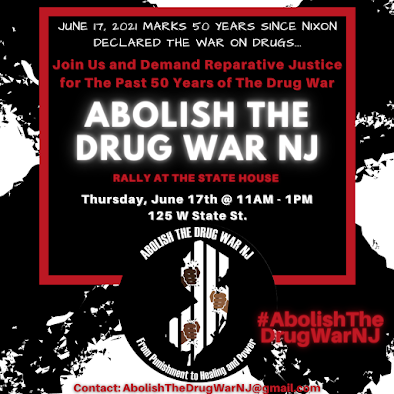Abolish Drug War Campaign decries half century of biased, fruitless drug laws
Black History Month in New Jersey this year will see the launch of a campaign that confronts and seeks to close one of the most tragic chapters of Black history. Abolish the Drug War-NJ is holding a virtual launch on February 1 to examine the drug war’s half century of devastation that has fallen mainly on people of color.
The war on drugs that Richard T. Nixon stared by declaring in 1971 that drugs were “public enemy number one,” marks its 50th anniversary this year. The half century of this conflict is not something to be celebrated for resolve but one to be lamented as an obdurate refusal to face facts. The idea of trying to arrest away the country’s drug problems has proved a horrendous folly whose fallout has been disproportionately harsh criminal sentences visited disproportionately on communities of color.
More than half of Americans report they have violated the country’s drug laws. The rates of these breaches do not significantly differ by race, although in the US, and in New Jersey, we see lopsided arrests of non-white drug users. For example, nationally 19 percent of people who sell drugs are black, but they represent 64% of arrests, and black New Jerseyans are 2.6 times more likely than white New Jerseyans to be arrested for their personal substance use.
The Drug War exacerbated the already harsh and racially disparate legal assault on drug use that began decades before Nixon’s declaration and that culminated in the current era of mass incarceration. That pronouncement in the early 1970s was amplified in the 1980s by the “just say no” battle cry. Police departments, courts and lawmakers increasingly vilified drug users - or a certain subset of them - and adopted policies and criminal codes in keeping with that hostile stance.
A complement to decriminalization is harm reduction, an enlightened approach to drug use encompassing a host of responses that advance a public health response to people still using drugs. Its overarching goal is to keep alive and in the best health possible people who use drugs, while engaging with them. Harm reduction includes making naloxone widely available to revive overdoses, syringe exchange programs to reduce the spread of disease, and extends to assisting with a host of basic services such as housing and health care. It is both a practical and humane approach. Over time, for many it creates a bridge to substance use treatment that otherwise likely would not have existed.
New Jersey has only just begun its reform efforts. Areas of the state that are home to large minority populations have been devastated by the war on drugs. One in three Black men will be involved in the criminal justice system at some point in their lives, most due to a drug offense. The effect of this on families includes eviction from public housing, loss of federal financial aid, and denial of public assistance. Additionally, 70 percent of women are primary caregivers to their children when sentenced to prison, putting children of single mothers into foster care .
In 2019 the Garden State spent $715 million on arrests, trials and incarceration of drug-related crime, primarily small personal use possession arrests. Communities that have adopted programs such as Law Enforcement Assisted Diversion (LEAD) which allow officers to divert individuals to treatment or social services, rather than making low-level drug arrests. Data reveal that individuals diverted through LEAD programs were 58 percent less likely to be rearrested, as compared to similar individuals processed through the criminal justice system. This is consistent with research that shows that meeting individual service needs and emotional supports predicts reduced drug use, yet we continue to feed resources to incarceration, which does not.
With the the passage in November of a referendum to legalize recreational use of marijuana, New Jersey voters took a significant step away from criminalization of drug use. After the past half century, it’s plain that while President Nixon called it a war on drugs, it has in fact been a war on people, mainly people of color. The time is long past to retire the militant metaphor that leaves a legacy of countless targeted and collateral losses.
Please join us in our mission to abolish the drug war in NJ by registering here for our launch on February 1st, 2021.
Daniel Meara and Sandy Gibson


Comments
Post a Comment